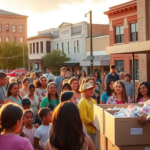Harlingen Mayor Calls for Presidential Disaster Declaration Following Historic Storm
In an urgent plea to the nation’s leadership, Harlingen Mayor Norma Sepulveda has requested a Presidential Disaster Declaration from President Donald Trump following a historic storm that devastated the city on March 26, 2025. The catastrophic event, which deposited nearly 22 inches of rain in a matter of hours, led to unprecedented flooding and extensive damage across Harlingen. This declaration is deemed essential for the city to access federal resources crucial for temporary housing and the restoration of public infrastructure.
A Storm’s Unprecedented Impact on Harlingen
The near-record rainfall transformed Harlingen into a scene of chaotic flooding, affecting thousands of homes and businesses. In the aftermath, Mayor Sepulveda depicted a city grappling with loss and uncertainty. “It was as if the weather declared war on Harlingen,” she said in a heartfelt appeal. “Our streets became rivers, displacing families and leaving a trail of destruction that our community will take years to recover from.”
Harlingen’s largely flat topography exacerbated the flooding, as the city’s drainage systems quickly became overwhelmed, offering minimal shelter from the deluge. Emergency response units were stretched thin, with shelters reaching capacity within hours. Many residents continue to live in temporary accommodations, unsure when they can return to their homes.
Regional Support and a Call for Action
The request for a disaster declaration is bolstered by state and federal representatives. Texas Governor Greg Abbott has endorsed the call, submitting an official request on April 17. U.S. Senator John Cornyn has also expressed support, emphasizing the urgent need for federal intervention. Despite these efforts, the city has yet to receive a response, prompting Mayor Sepulveda’s direct appeal to President Trump.
“They placed their trust in their city, their state, and their nation,” Sepulveda wrote. “Now is the time to show them that trust was not misplaced.”
Implications for the Rio Grande Valley
For Valley residents, the storm is a stark reminder of the vulnerability many communities face due to extreme weather events, which have become increasingly common in South Texas. The potential for federal aid represents a lifeline, providing the financial support needed for rebuilding efforts and instilling hope for recovery.
RGV news outlets, like Texas Border Business, have highlighted the broader implications of such disasters on local economies. The potential influx of federal funds could invigorate local businesses and provide employment opportunities, spurring a quicker economic rebound.
Context and Historical Parallels
This isn’t the first time Harlingen or the RGV region has faced natural disasters. Historical data shows a pattern of severe weather incidents, underscoring the need for robust infrastructure and emergency planning. The resiliency shown by Valley residents in past events is a testament to their enduring spirit, yet the need for preventative measures and federal support remains crucial.
Dr. Luis Flores, a climatologist at the University of Texas Rio Grande Valley, remarked on the frequency and intensity of these storms. “Climate models have consistently pointed to increased rainfall in areas like the RGV. It’s imperative that local governance works in tandem with federal agencies to bolster defenses against future events,” he stated.
The Path Forward
As Harlingen waits for a Presidential Disaster Declaration, community leaders stress the importance of collective action and long-term resilience planning. The city’s recovery is not solely dependent on immediate aid but also on forward-thinking approaches that focus on sustainability.
Mayor Sepulveda is optimistic about receiving the necessary support to help the city and its residents rebuild and recover. “Every day without help makes hope harder to hold onto,” she poignantly noted. The city continues its work, supported by a community that refuses to give up.
For those seeking more information or wishing to assist, the City of Harlingen has established a dedicated website offering resources and updates on ongoing recovery efforts.
Highlighting Local Resilience and Resources
Community organizations have mobilized quickly, providing resources and support to those affected by the storm. Various local groups are arranging food and clothing drives, while volunteers assist with cleanup efforts. Valley residents can stay informed through RGV news outlets and community platforms, ensuring they have access to the latest information and support services.
In conclusion, Harlingen’s call for federal assistance underscores the broader challenges facing many communities in the Rio Grande Valley. This plea reflects not only an immediate need but also a call for ongoing collaboration between local, state, and federal entities to secure a safer, more sustainable future for all Valley residents. As the story unfolds, the community remains resilient, drawing strength from its unity and determination to overcome adversity.







